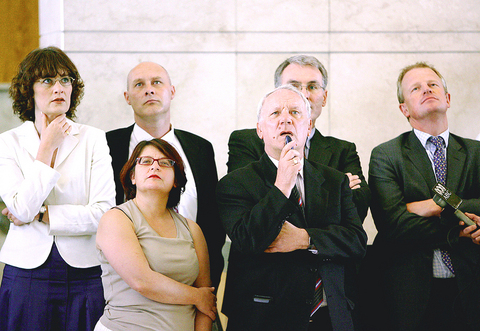Australia's government yesterday achieved a decade-old dream and privatized telco behemoth Telstra with a US$12 billion share offer that was snapped up by enthusiastic investors.
Shares in the third tranche of the sale rose nine percent against the first instalment price when they debuted on the Australian Stock Exchange as Canberra shed 35 percent of its 51.8 percent stake in the formerly state-owned firm.
But Telstra's overall share price fell 3.2 percent as investors sold off their existing stock to buy into the government's new offer, which will leave it with a 17 percent state in Telstra.

PHOTO: AFP
The new shares opened their listing at A$2.11 and closed at a high of A$2.18, compared to the US$2 first instalment price paid by small or retail investors and the A$2.10 paid by institutions.
"[Telstra] finally has fulfilled its ambition to be more truly independent of government and no longer part of a government enterprise," said BBY analyst Mark McDonnell told the Australian Broadcasting Corporation.
Australian Finance Minister Nick Minchin hailed the success of the sale saying that the government could now play its role of regulator in the telco industry without fear of a conflict of interest.
Telstra would also be better off now that the government was no longer a substantial shareholder, he said.
"It has a been a huge load on the company for too long and at last the company is free of that weight upon it of the government's majority shareholding," he said.
"So in my view all Telstra shareholders will be much better off," the minister added.
The opening price for the new offer was a nice reward for long-suffering shareholders in Telstra who have seen the value of the stock decline by more than 30 percent since July 2005 as the government pushed towards privatization, analysts said.
"It was up about five percent for individual investors who bought at A$2 dollars so that's a nice little reward for long-suffering shareholders," said Austock Brokers senior client adviser Michael Heffernan.
The sale came a day after the government announced that unexpected enthusiasm for the Telstra sale had nearly doubled the value of an expanded government float to A$15.5 billion dollars (US$11.9 billion).
Minchin said on Sunday that retail investors would pay a total of A$3.60 a share and institutional investors A$3.70 for 4.25 billion shares -- up from the 2.15 billion shares originally on offer.
Yesterday's partial float -- the second-biggest sale in Australian corporate history -- is known as T3 because it is the third tranche of Telstra shares offered after T1 in 1997 and T2 in 1999, which brought in A$16 billion.
But some stockbrokers said the lower Telstra shares did not augur well for investors who were counting on making a stag profit yesterday on the sale of their new securities in Australia's biggest telco.

Nvidia Corp yesterday unveiled its new high-speed interconnect technology, NVLink Fusion, with Taiwanese application-specific IC (ASIC) designers Alchip Technologies Ltd (世芯) and MediaTek Inc (聯發科) among the first to adopt the technology to help build semi-custom artificial intelligence (AI) infrastructure for hyperscalers. Nvidia has opened its technology to outside users, as hyperscalers and cloud service providers are building their own cost-effective AI chips, or accelerators, used in AI servers by leveraging ASIC firms’ designing capabilities to reduce their dependence on Nvidia. Previously, NVLink technology was only available for Nvidia’s own AI platform. “NVLink Fusion opens Nvidia’s AI platform and rich ecosystem for

WARNING: From Jan. 1 last year to the end of last month, 89 Taiwanese have gone missing or been detained in China, the MAC said, urging people to carefully consider travel to China Lax enforcement had made virtually moot regulations banning civil servants from making unauthorized visits to China, the Control Yuan said yesterday. Several agencies allowed personnel to travel to China after they submitted explanations for the trip written using artificial intelligence or provided no reason at all, the Control Yuan said in a statement, following an investigation headed by Control Yuan member Lin Wen-cheng (林文程). The probe identified 318 civil servants who traveled to China without permission in the past 10 years, but the true number could be close to 1,000, the Control Yuan said. The public employees investigated were not engaged in national

ALL TOGETHER: Only by including Taiwan can the WHA fully exemplify its commitment to ‘One World for Health,’ the representative offices of eight nations in Taiwan said The representative offices in Taiwan of eight nations yesterday issued a joint statement reiterating their support for Taiwan’s meaningful engagement with the WHO and for Taipei’s participation as an observer at the World Health Assembly (WHA). The joint statement came as Taiwan has not received an invitation to this year’s WHA, which started yesterday and runs until Tuesday next week. This year’s meeting of the decisionmaking body of the WHO in Geneva, Switzerland, would be the ninth consecutive year Taiwan has been excluded. The eight offices, which reaffirmed their support for Taiwan, are the British Office Taipei, the Australian Office Taipei, the

CAUSE AND EFFECT: China’s policies prompted the US to increase its presence in the Indo-Pacific, and Beijing should consider if this outcome is in its best interests, Lai said China has been escalating its military and political pressure on Taiwan for many years, but should reflect on this strategy and think about what is really in its best interest, President William Lai (賴清德) said. Lai made the remark in a YouTube interview with Mindi World News that was broadcast on Saturday, ahead of the first anniversary of his presidential inauguration tomorrow. The US has clearly stated that China is its biggest challenge and threat, with US President Donald Trump and US Secretary of Defense Pete Hegseth repeatedly saying that the US should increase its forces in the Indo-Pacific region